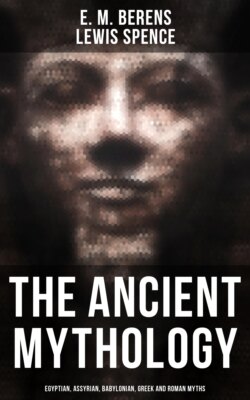Читать книгу The Ancient Mythology: Egyptian, Assyrian, Babylonian, Greek and Roman Myths - Lewis Spence - Страница 37
На сайте Литреса книга снята с продажи.
The Babylonian Myth of Creation
ОглавлениеFew creation myths are more replete with interest than those which have literary sanction. These are few in number, as, for example, the creation story in Genesis, those to be found in Egyptian papyri, and that contained in the Popol Vuh of the Maya of Central America. In such an account we can trace the creation story from the first dim conception of world-shaping to the polished and final effort of a priestly caste to give a theological interpretation to the intentions of the creative deity; and this is perhaps more the case with the creation myth which had its rise among the old Akkadian population of Babylonia than with any other known to mythic science. In the account in Genesis of the framing of the world it has been discovered that two different versions have been fused to form a single story; the creation tale of the Popol Vuh is certainly a composite myth; and similar suspicions may rest upon the analogous myths of Scandinavia and Japan. But in the case of Babylonia we may be convinced that no other influences except those of the races who inhabited Babylonian territory could have been brought to bear upon this ancient story, and that although critical examination has proved it to consist of materials which have been drawn from more than one source, yet these sources are not foreign, and they have not undergone sophistication at the hands of any alien mythographer or interpolator.
The Seven Tablets of Creation.
It would seem that this Babylonian cosmogony was drawn from various sources, but it appears to be contained in its final form in what are known as the Seven Tablets of Creation, brought from the library of Assur-bani-pal at Nineveh and now in the British Museum. These have from time to time been supplemented by later finds, but we may take it that in this record we have the final official development of Babylonian belief, due to the priests of Babylon, after that city had become the metropolis of the empire. The primary object of the Seven Tablets was to record a terrific fight between Bel and the Dragon, and the account of the creation is inserted by way of introduction. It is undoubtedly the most important find dealing with Babylonian religion that has as yet come to light. Before we advance any critical speculations respecting it, let us set forth the story which it has to tell.
As in so many creation myths we find chaotic darkness brooding over a waste of waters; heaven and earth were not as yet. Naught existed save the primeval ocean, Mommu Tiawath,1 from whose fertile depths came every living thing. Nor were the waters distributed, as in the days of man, into sea, river, or lake, but all were confined together in one vast and bottomless abyss. Neither did god or man exist: their names were unknown and their destinies undetermined. The future was as dark as the gloom which lay over the mighty gulf of chaos. Nothing had been designed or debated concerning it.
